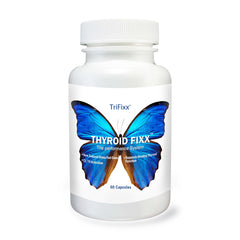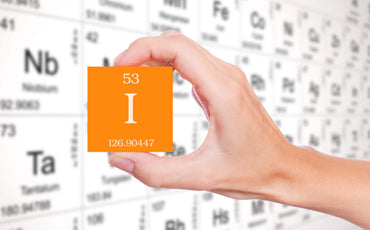
Optimum thyroid functioning is required to help the body navigate the various metabolic processes necessary for normal growth and development. Thyroid health is important at every stage of life, and impairment in thyroid functioning can cause individuals to experience an extensive list of health problems; many of which, present with debilitating symptoms. To improve thyroid health, experts have recommended different methods, including regular exercise, a structured diet plan, reduced exposure to environmental toxins, and the use of supplements and alternative therapy products such as iodine and D3/K2. TriFixx™ provides a holistic line of nutraceuticals designed to help boost thyroid health in people with impaired thyroid functions. The TriFixx™ range has shown convincing evidence proving its efficacy in the management of thyroid dysfunction in humans.
INTRODUCTION: The Importance Of Your Thyroid Health And What You Can Do About It
By now, you should have heard a few things about the thyroid gland. As small as it looks, the thyroid gland produces hormones that influence and control metabolic processes and brain functions in the human body. This makes it an important organ worthy of scientific inquiries and studies. Should the thyroid organ be defective, bone development, lipolysis (fat), tissue differentiation (cell change), thermogenesis (warmth), and energy storage will be adversely affected. This explains why the thyroid is considered an important organ in biological sciences. As research inquiries continue to unravel the mysteries surrounding this important organ, various medical reviews have continued to highlight different methods of improving thyroid health.
Thyroid Health And Different Life Stages
At every stage of life, the thyroid performs vital roles essential for normal growth. In foetal life, the thyroid is the first component of the body's endocrine system to develop. At approximately four weeks after conception, this organ originally develops as an epithelial diverticulum (cell bud) arising at the foregut endoderm in a region close to the primitive tongue. Development completes at about the 7th week after conception, and thyroid hormone synthesis starts roughly around the 12th week after conception. Depending on the maternal intake of iodine, the foetus makes enough thyroid hormone needed for the normal growth and development of the brain and bones. Pregnant women are advised to consume adequate quantities of iodine primarily due to foetal reliance on thyroid hormones.
At puberty, the synthesis of thyroid hormones is more pronounced and now clearly defined. This stage of life is linked to cognitive development, rapid growth, and the development of sexual characteristics. In conjunction with other organs of the endocrine system, the thyroid plays an important role in regulating the body's metabolic rate and helps hasten pubertal growth. Depletion in the thyroid hormone levels or disorders of the thyroid is primarily responsible for the growth impairment noticed in adolescents. Thyroid functions continue steadily throughout the lifetime and peaks during adulthood.
In adults, the thyroid helps to maintain the normal functioning of the body systems. Research inquiries, focused on the endocrine effects on adult health, have revealed that biochemical signalling from the hypothalamic-pituitary-thyroid axis (HPT) plays a significant role in adulthood. Since it is general knowledge that organ functions decline during this stage of life, experts have stressed the importance of adequate dieting and medical check-ups targeted at evaluating thyroid health in adults. Scientists still wonder how such a tiny organ is naturally bestowed with a huge responsibility at every stage of life.
Consequences Of Impaired Thyroid Health
Pituitary control and signals from the hypothalamus play integral roles in regulating the levels of thyroid hormones in the body. This is particularly important to maintain adequate functioning of the thyroid. Too low or too high levels of thyroid hormones in the body manifest as clinical presentations of disorders and health impairments.
In the foetus, defects in thyroid hormone synthesis directly affect the first stages of organ growth and development. Research inquiries have linked maternal depletion of thyroid hormone levels with foetal impairments such as poor brain development, mental retardation, stunted growth, poor bone formation, miscarriage and preterm (premature) delivery. The fact that iodine deficiency in pregnant women and thyroid defects in newborns have so much clinical consequences further establishes the important roles of the thyroid.

During adolescence, impaired functioning of the thyroid gland can delay puberty and adversely affect the development of secondary sexual characteristics. In the females, the menstrual cycle might take longer to develop or become disrupted, due to the thyroid’s influence on estrogen and progesterone. Also, the reproductive system can become immature, leading to defective production of the female reproductive hormones. In males, teeth and bone formation can be affected, leading to abnormal body architecture and generalized body weakness in some cases. Although thyroid disorders are usually uncommon in teenagers, the occurrence of thyroid defects in this population generally manifests as physical and mental health complications requiring medical intervention in severe cases.
In all population categories, thyroid dysfunction is a direct consequence of an overactive or underactive thyroid, abnormal changes in the thyroid anatomy, underdeveloped thyroid, thyroid enlargement, and formation of single or multiple thyroid nodules. In hyperthyroidism, there is an increased production of thyroid hormones leading to a range of symptoms, including: weight loss, heat intolerance, sweating, tremor, heart rate variability and irritability.
When thyroid hormones are under-produced i.e. hypothyroidism (the most common form of thyroid disorder), the symptoms presented in patients depends on the root cause of thyroid dysfunction. Symptoms presented in this case include: bradycardia (slow heart rate), cold intolerance, constipation, weight gain, tiredness, slower thinking, and speech defects. Thyroid cancers are also becoming an important point of discussion concerning the thyroid.
Representing about 1.5% of all cancer cases in the United States, thyroid cancers directly affect the structure and anatomy of the thyroid. Uncontrolled outgrowths of the thyroid disrupt the physiological arrangement of thyroid lobules and hormone-producing cells. Symptoms noticed in patients with thyroid cancers include: difficulty in swallowing, dyspnoea, recurrent cough, hoarse voice, and different episodes of choking spells.
What You Can Do To Improve Thyroid Health
The clinical symptoms of thyroid dysfunctions constitute a huge health burden in the people affected. So, it is common to notice different publications and inquiries focusing on the different ways to improve thyroid health as a way to avoid thyroid dysfunctions. Diet regimens, supplements, and alternative medicine protocols have been developed to help maintain thyroid health.
It is advisable that people should consume adequate iodine and D3/K2 in their diet and also avoid/reduce exposure to environmental toxins. A weekly exercise regimen has also shown promising results in boosting thyroid health. In people with signs of a developing thyroid impairment, an alternative therapy might be needed to boost thyroid health.
The TriFixx™ nutraceutical line provides brilliant frontline thyroid support and therapy, with proven efficacy in stabilizing thyroid functioning and improving disease prognosis. As a non-prescription product, TriFixx™ is readily available and specifically designed to improve thyroid health.
REFERENCES















